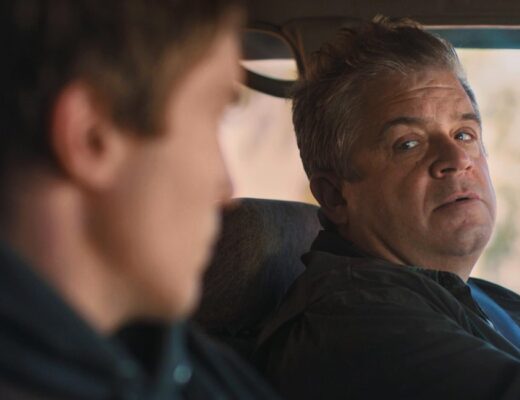Set almost entirely in and around a grimy, uninviting tavern in the Australian outback, Kitty Green’s follow-up to 2019’s The Assistant, The Royal Hotel, serves as an expansion of that film’s themes of workplace intimidation and sexual harassment while relocating its micro-aggressions and insinuated threats to a more commercially viable (in theory anyway) genre. In its oppressive production design, supporting cast of volatile, frequently intoxicated knuckle-draggers, as well as merely embracing the old canard that everything in Australia is trying to kill you, the film superficially resembles Ozploitation titles like Wake in Fright or Roadgames, but the unease it’s playing upon is far more universal. Anyone who’s ever worked an understaffed shift at a bar or restaurant or been a small woman fending off the advances of a belligerent customer while still honoring the axiom that they’re “always right” is sure to see themselves in the film. The specter of potential sexual violence hangs over The Royal Hotel, yet the film deftly positions its main character as someone attuned to the pervasive warning signs; attempting to keep both herself and her less attentive friend safe. It’s not a horror film per se, but its real skill is seen in how it feels like it could become one at literally any moment.
Reuniting with Green, her The Assistant director, the film stars Julia Garner as Hanna who, along with her friend Liv (Jessica Henwick of Glass Onion), is day-drinking and backpacking her way through Australia. Opening at a rave being hosted in a barge cruising around the Sydney harbor, the perpetual party runs into the crushing reality that the two women have already burned through their entire nut for the trip and need to find quick work for an infusion of funds. With no other real options for two unskilled foreigners, the young women travel by train and bus to the middle of nowhere, a small mining community hours away from the closest town, to tend bar at the titular pub — whatever its ostensible claims to being a hotel, the upstairs residence is primarily a dorm-like flophouse — where being a capable barmaid appears to be a secondary concern next to giving the clientele something cute to leer at. Hanna instantly has strong reservations about the entire scene, but Liv argues there’s no harm in cracking open beers for a few weeks to make enough money to fund the rest of the trip. Besides, it’ll be “an adventure.”
Presided over by its ornery proprietor, Billy (Hugo Weaving), introduced barging into the women’s bathroom to scream at Hanna and Liv, wearing only their towels, for running the shower during a drought — he also calls Hanna a “smart cunt,” just to cement the sterling first impression — and his no-nonsense wife Carol (Ursula Yovich), the Royal has a small but devoted patronage, predominantly made up of roughnecks who are flush with cash and short on other options to spend it on. While Liv plays the part of bubbly, good-time gal, humoring the off-color jokes and trading shots with the male customers, Hanna can barely conceal her disdain and distrust of the patrons. There’s a perceptible edge to even the friendliest of interactions at the Royal; even the men who don’t give off a specifically “rapey” vibe still treat courtship the way a caveman might choose a mate. Neither woman is entirely immune from the attention, with even Hanna allowing herself to be kissed by Matty (Toby Wallace), one of the more fawning locals, but it’s clear that this is a crowd not used to being told “no.”
As in The Assistant, Green is primarily concerned with chronicling process and routine, treating each shift — some of which carry on until the middle of the night as “last call” appears to be more of a suggestion than a hard and fast cutoff — as a series of fraught negotiations and confrontations; the film repeatedly inches right up to the line of things spiraling out of control, only to cautiously walk its way back. It’s also, in a very general sense, about being a young woman, practiced in subservience and swallowing their fear and pride because their physical and financial well-being are tied to keeping male benefactors happy. Billy’s the closest thing to an authority figure at the Royal, not just serving as the owner of the establishment, but its de facto bouncer as well. However, he’s also a fall-down drunk who’s clearly skimming from the till — conveniently, he’s always just a day away from making a bank run whenever Hanna and Liv make noise about not having been paid yet — and his “boys will be boys” approach to policing poor behavior means rowdy customers tend not to stay banned from the bar for long. When Carol finally drives Billy to a local hospital a day’s drive away to dry out, it’s greeted with a fleeting sense of relief, followed immediately by the chilling realization that there’s no longer an intimidating male figure around serving as lion tamer. The ladies are all on their own now.
The lack of release will likely serve as a point of frustration for some viewers, as will the absence of most conventional, young women-in-peril thrills. Rather the tension of the film comes in navigating that even “the good guys” are at best unreliable or prone to fits of terrifying rage, and, simultaneously, even the ones who might be sociopaths aren’t without their uses (why get hung up on subverting traditional gender roles when there’s a giant fucking snake lose in your apartment). The film never quite loosens the pressure valve, allowing the anxiety to incrementally build until you feel as though it simply might explode, and, for those who can tap into its anxiety-inducing wavelength, The Royal Hotel is something of a scream. Green emphasizes the suspense in, of all things, multitasking: on any given night, Hanna must cover the bar all by herself, grab beers for a dozen angry customers, and defuse assorted flair-ups, all while trying to project an air of professionalism and hospitality. Complicating matters further, Liv is either unaware of or indifferent toward the danger her drinking is putting her in; Hanna is thereby forced into the role of protector and scold, constantly having to intervene on her friend’s behalf to prevent her from being taken advantage of. Late in the film, as it descends into chaos, with smoke filling the pub, a violent altercation involving an ax, and drunken miners brawling in the parking lot like silverback gorillas — although true to form, none of this plays out exactly as one would expect — Hanna’s still running to and fro; trying to drag Liv out of a dangerous situation of her own making and being called a frigid buzzkill for her trouble. Rare is the film that acknowledges what an absolute drag it is having to always be the responsible one.
Loosely inspired by the 2016 documentary Hotel Coolgardie, The Royal Hotel is attempting to chart a middle ground between almost clinical observations of toxic, albeit recognizable, behavior and the requisite nods to being a thriller; one of Green’s more memorable set dressing choices is to have the back of the bar framed by dozens of vipers preserved in giant jars, which feels like a metaphor if ever there was one. The film admittedly sputters a little in trying to devise a conclusion that serves both of those masters, before ultimately landing on a true mic drop of a closing visual; playing off an overly familiar trope to be sure, but one that still pulses with defiance and justifiable outrage, not least of all because how infrequently moments like these are built around women. To quote Fight Club, a film with a markedly different perspective on gender but sharing a certain anarchic spirit with The Royal Hotel, “It’s only after we’ve lost everything that we’re free to do anything.”
DIRECTOR: Kitty Green; CAST: Julia Garner, Jessica Henwick, Hugo Weaving, James Frecheville, Daniel Henshall; DISTRIBUTOR: NEON; IN THEATERS: October 6; RUNTIME: 1 hr. 31 min.







